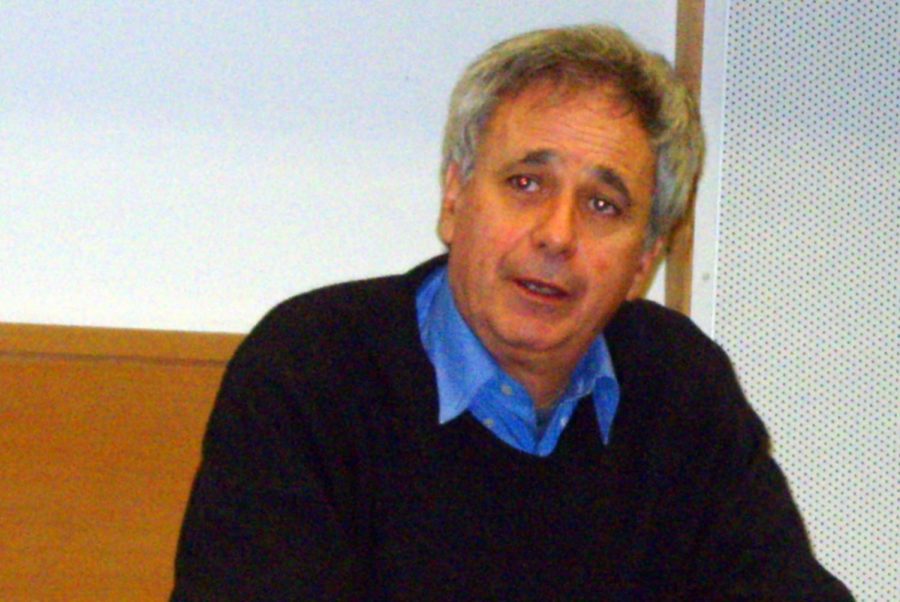Renowned historian visits campus, discusses Israeli history
October 5, 2018
“Challenging popular narrative on the inside is seen as treason. My advisor warned me that as an Israeli Jew, I could have gotten out an easier way. I didn’t understand him then, and continued on my path which changed my life forever.”
Co-sponsored by the Department of History, historian and social activist Ilan Pappe visited campus on Sept. 13 to give a lecture entitled “History is Relevant: The Israeli New History and its Legacy.” The talk was part of a wider discussion in Cleveland regarding the Israeli New History as an interpretation of 1948.
Pappe was also present at the City Club of Cleveland on Friday, Sept. 14 to lecture on the evolution of Zionist thought and its effect on the past and future of the Israeli-Palestinian conflict.
Pappe is widely known as a member of the first wave of Israel’s “New Historians,” a group who, as of the release of important British and Israeli government documents in the early ‘80s, have been rewriting the history of Israel’s creation in 1948 and the corresponding expulsion of 700,000 Palestinians. He also serves as the Director of the European Centre for Palestine Studies at the University of Exeter’s College of Social Sciences and International Studies and Co-Director of the Exeter Centre for Ethno-Political Studies.
A scholar living in exile, Pappe authored “The Idea of Israel: A History of Power and Knowledge” in 2014. The book examines the role of Zionist ideology in shaping the country’s academic and cultural institutions, thereby affecting the actual production of knowledge within Israel.
Professor Ted Steinberg of the Case Western Department of History explained the benefits of bringing a controversial speaker like Pappe to campus.
“Universities are supposed to be organized around independent thought,” he said. “We want students to think for themselves, and part of that is being allowed to consider complex problems in the world from multiple perspectives.”
Pappe’s Sept. 13 talk discussed the emergence of the Israeli New History as an interpretation of 1948 and the post-Zionist debate which followed this interpretation. He also recounted his personal experiences after the emergence of the debate, his eventual exile and the impact the new debate has had on Israel and Palestine since its emergence.
Pappe went on to discuss what he considers to be key “myths” perpetuated by the Israeli government which were debunked by the New Historians, the most important being the means by which Palestinians became refugees.
“The information about the planned de-Arabization of the region is all there in that era’s New York Times, Red Cross; one doesn’t even need the declassified files,” explained Pappe, “and the sheer numbers—45,000 Palestinians expelled in 10 hours from their villages in Jafaa. Even in war times, this is nothing more than ethnic cleansing.”
Pappe also used his perspective to analyze what he considers the Zionist leaders’ rationalization for the expulsion, stating, “Even the common people can rationalize the expulsion of Arabs as redemption for the Jewish homeland. The colonial overtones of the 1948 Jewish state creation still stands, as Israel was intended to be democracy with a clear Jewish demography. This ideology is all intent on keeping up the status quo in the region and just leads to false narratives.”
Acknowledging that he was discussing a controversial and sensitive topic, Pappe said that he is the only original New Historian left and that alternatives to the main narrative were “eroding slowly,” especially after the Second Intifada and a rise in Israeli right-wing ideologies.
“Discrimination in the name of Zionism continues on which is the main reason that the ongoing reality resonates so much with the memory of refugees,” said Pappe. “The ethnic cleansing in 1948, if it hadn’t continued, would have been one, horrible event that people in the region could eventually move on from. But the continued mistreatment and abuse makes peace in the face of the Israel-Palestine conflict less likely each day.”
The lecture was well received by the audience, many applauding the speaker’s courage to hold onto his controversial beliefs while others who shared his views were too fearful of external pressures.
One student, a political science major, commented, “I like how [Pappe] was able to talk critically about Israeli ideology without putting Palestine on a pedestal either. As in many sensitive topics, being bipartisan is no easy feat.”



